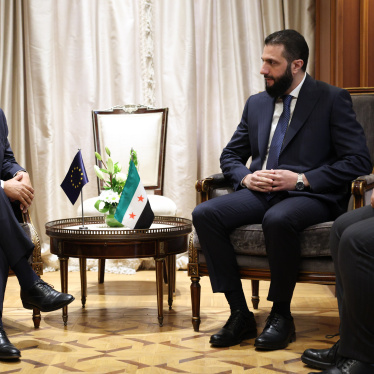The Kazakhstan government is undermining the prospects for free and fair parliamentary elections by seriously harassing its political opponents, Human Rights Watch said in a new report released today.
"The government is attempting to keep its fiercest critics out of the media and out of politics," said Rachel Denber, acting executive director of Human Rights Watch's Europe and Central Asia Division. "This is going to undermine the integrity of the elections this fall."
The 53-page report, "Political Freedoms in Kazakhstan," details government harassment of Kazakhstan's opposition through arbitrary criminal and misdemeanor charges and threats of job dismissal, in many cases aimed at preventing them from running for public office. Among those imprisoned were Galymzhan Zhakianov and Mukhtabar Ablizaov, the founding leaders of the Democratic Choice of Kazakhstan, an opposition group formed in November 2001. Abliazov was released in May 2003. Also imprisoned and then released in 2003 was Sergei Duvanov, an opposition journalist and trenchant critic of government corruption.
The Human Rights Watch report also documents government actions over the past two years that have prevented some opposition groups from entering electoral politics. The report describes how the July 2002 law on political parties served to reduce the number of registered parties from 19 to only nine.
Beginning in 2000, opposition leaders began to allege that high-level government officials, including President Nursultan Nazarbaev and his close associates, received kickbacks from foreign oil companies, and that the funds were held in Swiss bank accounts. In connection with these allegations, in 2003 a U.S. federal court indicted two American businessmen on charges of corruption and tax evasion. Several journalists affiliated with the opposition, who published articles about the scandal, became victims of physical attacks by unknown assailants.
"The Kazakhstan government is obviously trying to stop the exposure of official corruption, especially in the oil sector," said Denber.
The Kazakhstan government has a record of manipulating elections. In the September 2003 local council (maslikhat) elections, the opposition claimed that the government attempted to exclude its candidates from the ballot through arbitrary misdemeanor and other criminal charges, and other means of harassment and intimidation.
The authorities also manipulated the December 2002 parliamentary by-elections. The Organization for Security and Cooperation in Europe (OSCE) found Kazakhstan's 1999 presidential and parliamentary elections to be deeply flawed.
The 2003 local council elections were critical to Kazakhstan's election system, as under amendments to the elections law adopted March 15, local councils are now authorized to appoint members of electoral commissions. The March 15 amendments also opened the ballot to individuals previously convicted of misdemeanor offenses, which had previously been leveled against government opponents to keep them off the ballot.
Political parties that submitted registration documents in accordance with the law should be immediately registered, Human Rights Watch said. Domestic election monitors should have access to the polls, irrespective of whether they are supported through foreign financing.
Human Rights Watch also called for the immediate release of Galymzhan Zhakianov.







